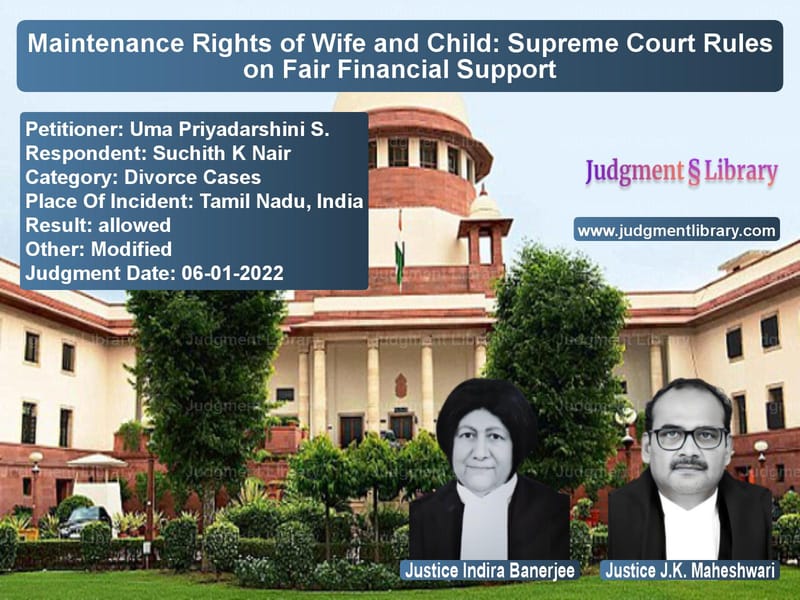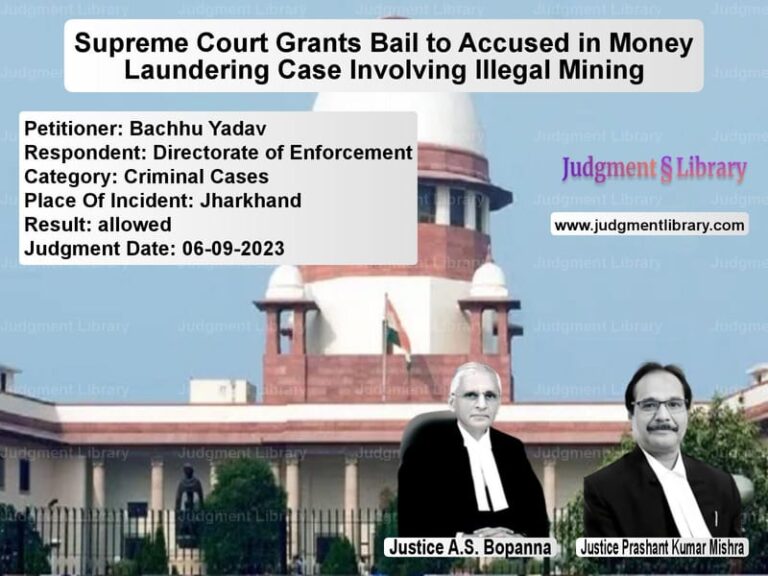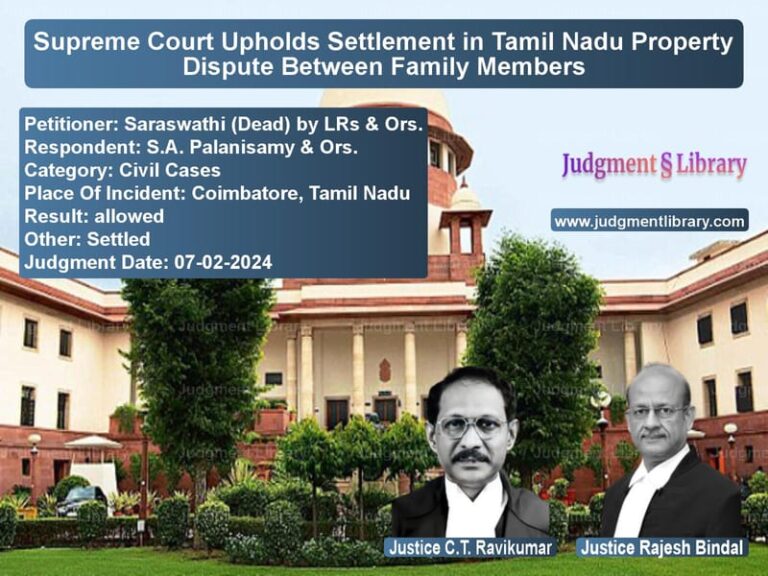Maintenance Rights of Wife and Child: Supreme Court Rules on Fair Financial Support
The case of Uma Priyadarshini S. v. Suchith K Nair addresses the issue of maintenance for a wife and child under matrimonial laws. The Supreme Court examined whether a working woman is entitled to maintenance and how financial obligations should be distributed between separated spouses. This case is significant for shaping maintenance laws and the rights of children to adequate financial support.
Background of the Case
The dispute arose from a matrimonial proceeding between the appellant, Uma Priyadarshini S., and the respondent, Suchith K Nair. The appellant filed a petition for maintenance for herself and her minor son under the Hindu Marriage Act, 1955. The Subordinate Judge, Poonamallee, in an interim order dated November 23, 2016, directed the respondent to pay:
- ₹25,000 per month towards interim maintenance for the appellant.
- Actual educational expenses of the child.
Both parties challenged this order in the Madras High Court. The High Court modified the order, holding that the appellant was not entitled to any maintenance as she was gainfully employed. It reduced the interim maintenance for the child to ₹15,000 per month while continuing the provision for educational expenses.
Dissatisfied with the High Court’s decision, the appellant approached the Supreme Court, arguing that the maintenance amount awarded for the child was insufficient and that the respondent should contribute more towards their son’s well-being.
Arguments of the Appellant (Uma Priyadarshini S.)
- The appellant contended that ₹15,000 per month for the child’s maintenance was too meager given his educational and living expenses.
- She argued that just because she was employed, it did not exempt the respondent from providing maintenance.
- The respondent was a commercial airline pilot earning a substantial salary, and he could afford to pay higher maintenance.
- The child’s educational expenses alone exceeded ₹1,00,000 per year, which needed to be fairly shared.
- The High Court failed to consider the child’s best interests while reducing the maintenance amount.
Arguments of the Respondent (Suchith K Nair)
- The respondent argued that he had been regularly paying for the child’s educational expenses and fulfilling all his financial obligations.
- Due to the COVID-19 pandemic, the aviation industry suffered, and his earnings significantly declined.
- He was already paying ₹1,00,000 per year for the child’s school fees and other expenses.
- The appellant was gainfully employed and could contribute to the child’s upbringing.
- The reduction of maintenance by the High Court was justified, as ₹15,000 per month was a reasonable amount.
Key Observations of the Supreme Court
1. Maintenance for Children Must Be Fair and Adequate
The Court held that a child’s financial needs should be realistically assessed and should not be arbitrarily reduced:
“₹15,000 per month for the maintenance of a child, considering today’s cost of living and educational expenses, is inadequate.”
2. Working Woman’s Right to Maintenance
The Court reaffirmed that while an employed wife may not be entitled to maintenance, her earnings should not relieve the husband of his responsibilities.
“The fact that the appellant is working does not absolve the respondent of his duty to provide adequate support for the child’s well-being.”
3. Responsibility of Both Parents
The Court emphasized that the burden of raising a child should not fall disproportionately on one parent:
“Both parents must share the responsibility of providing for the child’s needs in a proportionate manner based on their earnings and financial capacity.”
4. Financial Disclosure by Both Parties
The Court directed both parties to make full disclosures of their income, savings, and liabilities to ensure fair financial contributions:
“Both parties shall provide a complete disclosure of their financial standing before the concerned court for a final decision.”
5. COVID-19’s Impact on the Respondent’s Income
The Court took note of the aviation industry’s downturn during the COVID-19 pandemic and acknowledged that the respondent’s earnings may have been affected. However, it held that temporary financial distress cannot be a permanent ground for reducing maintenance.
“While economic downturns may affect a person’s earnings temporarily, it does not permanently exempt them from their obligations towards their child.”
Final Judgment
The Supreme Court ruled in favor of the appellant and made the following directions:
- The respondent shall bear all actual educational and medical expenses of the child.
- The maintenance amount was increased to ₹30,000 per month for the child’s living expenses, including food, clothing, and daily needs.
- The respondent shall pay ₹11,000 per month towards the house rent borne by the appellant.
- Both parties were directed to submit a complete financial disclosure before the concerned family court for a final maintenance decision.
- The respondent shall pay a lump sum amount of ₹1,00,000 towards the appellant’s litigation expenses.
The Court further clarified that in case of any change in financial circumstances, either party may approach the concerned family court for modification of the maintenance order.
Significance of the Judgment
This ruling reaffirms key principles related to maintenance under matrimonial laws:
- Children’s maintenance should be determined based on real expenses, not arbitrary figures.
- The financial responsibilities of separated parents should be proportionate to their earnings.
- Temporary financial hardships cannot be used as a permanent excuse to evade obligations.
- Working women may not be entitled to spousal maintenance, but the financial burden of raising a child should be shared fairly.
This judgment ensures that maintenance awards are based on fairness, equity, and actual needs, preventing undue hardships on either party while protecting the child’s best interests.
Petitioner Name: Uma Priyadarshini S..Respondent Name: Suchith K Nair.Judgment By: Justice Indira Banerjee, Justice J.K. Maheshwari.Place Of Incident: Tamil Nadu, India.Judgment Date: 06-01-2022.
Don’t miss out on the full details! Download the complete judgment in PDF format below and gain valuable insights instantly!
Download Judgment: uma-priyadarshini-s.-vs-suchith-k-nair-supreme-court-of-india-judgment-dated-06-01-2022.pdf
Directly Download Judgment: Directly download this Judgment
See all petitions in Alimony and Maintenance
See all petitions in Child Custody
See all petitions in Domestic Violence
See all petitions in Judgment by Indira Banerjee
See all petitions in Judgment by J.K. Maheshwari
See all petitions in allowed
See all petitions in Modified
See all petitions in supreme court of India judgments January 2022
See all petitions in 2022 judgments
See all posts in Divorce Cases Category
See all allowed petitions in Divorce Cases Category
See all Dismissed petitions in Divorce Cases Category
See all partially allowed petitions in Divorce Cases Category







